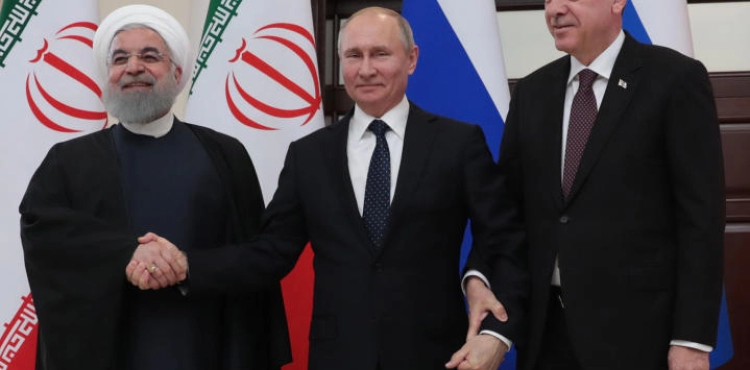Russian, Iranian and Turkish presidents met Thursday in southern Russia to try to restart the process of settling the Syrian dispute at a time when the radical Islamic state has been besieged and Washington is preparing for its military withdrawal from Syria.
Syria, which has been in a war for eight years and has killed more than 350,000 people, is at the heart of an intensive diplomatic movement this week, with the International Alliance against Jihadist Organization in Munich and the Middle East Summit in Warsaw. Mike Pompeo and Israeli Prime Minister Benjamin Netanyahu.
Officially, Vladimir Putin and Hassan Rouhani Halifi of Damascus, and Erdogan, who supports opponents of the regime in Syria, will focus on initiatives aimed at pushing forward the Syrian internal dialogue.
"We have gone a long way towards resolving the conflict," Putin said at the start of a meeting with Erdogan, who has already officially launched the summit, calling on his Turkish counterpart to give a "new push" to it.
For his part, the Turkish president said that the US president´s announcement in December that 2,000 US troops had been withdrawn from Syria "is one of the most important challenges ahead."
He said Russia and Turkey had agreed to conduct "joint patrols" to contain "extremist groups" in Idlib (northwestern) province, the only region in Syria still in the hands of the armed opposition.
"There was a military agreement for these patrols announced in September without further details," he said.
Erdogan also called for the withdrawal of Kurdish fighters from northeastern Syria. "Syria´s territorial integrity will not guarantee and the region will not return to its true owners" as long as they remain.
Ankara considers the Kurdish forces in the People´s Protection Units a terrorist group. It controls the strategic city of Manbij and the Syrian areas east of the Euphrates since the expulsion of jihadists of the Islamic state organization.
With support from Arab fighters in Syria´s democratic forces and the Washington-led international coalition, the Kurdish people´s protection units surrounded the jihadi organization of the Islamic state organization in a pocket of no more than a square kilometer.
Russia, which hosts the summit, has imposed itself as a key player in the conflict since its military intervention in Syria in 2015 to support Syrian President Bashar al-Assad, who now controls nearly two-thirds of the country´s land.
The Astana track, launched by Russia, Iran and Turkey, was overshadowed by UN-sponsored talks, without a final settlement of the Syrian dispute being reached.
"The focus will be on intensifying efforts to reach a political-diplomatic settlement," Kremlin spokesman Dmitry Peskov told reporters ahead of the summit.
Russian Foreign Minister Sergei Lavrov said the summit between the three presidents would be devoted to the formation of a commission to draft a new Syrian constitution for political transition.
The United Nations acknowledged in late December that it had failed to form a committee, citing problems linked to changes proposed by Damascus on the list of names. "We are ready to look for a solution to this situation," Lavrov said on Wednesday.
This is the fourth summit between Russia, Iran and Turkey. The Kurdish and Arab forces of the Syrian Democratic Forces (Qusd), backed by the Washington-led coalition, on Saturday launched their "final" operation against the last jihadi pocket in the eastern province of Deir al-Zour.
After the rapid growth of their power and their declaration of "caliphate" in vast territories in Syria and Iraq, the jihadists who once took control of large cities were defeated, but are now trapped within a few square kilometers.
The last summit between the three Presidents took place in September. At that time, differences emerged clearly between the three countries over the fate of Idlib province in northwestern Syria.
Putin and Recep Tayyip Erdogan had to meet again to stop a military operation in Idlib, which the Syrian government wanted, and then agreed to form a "demilitarized" Russian-Turkish zone in the vast province where opposition factions coexist.
The fate of Idlib province is also due to be discussed Thursday between Putin and Erdogan, who will meet separately before the summit with Rohani.
Under the Russian-Turkish agreement, all extremist fighters, especially the elements of the Sham Liberation Organization, which is dominated by the former al Qaeda branch, must withdraw from that region. However, the liberation elements of the Sham have strengthened their grip ever since.
Lavrov said that "they currently control more than 90 percent of the territory in the region," stressing on Wednesday that "there is no agreement provides for the eternal control of this cracker of terrorists on Syrian territory."
"We will do what we can to help the Syrian regime and the Syrian army liberate their land," he said.












